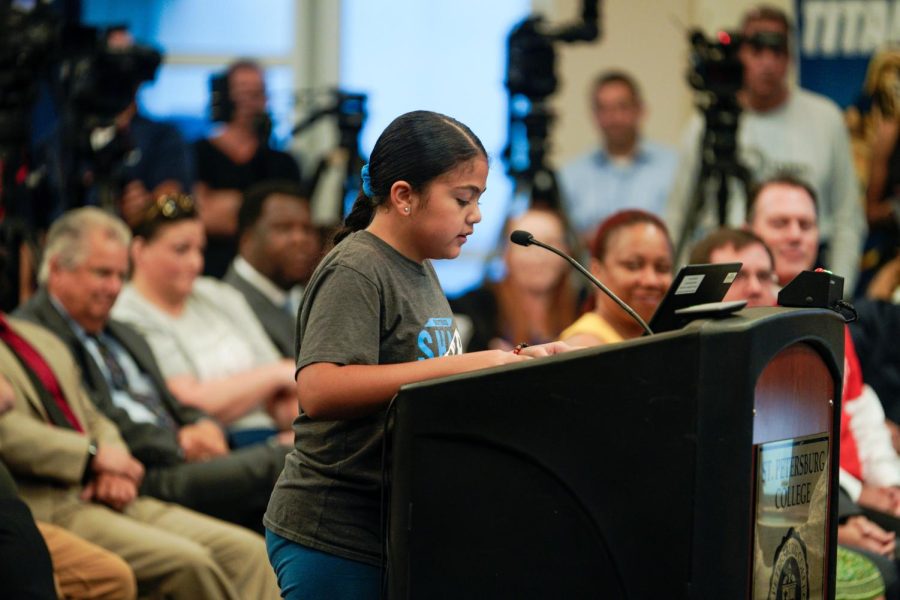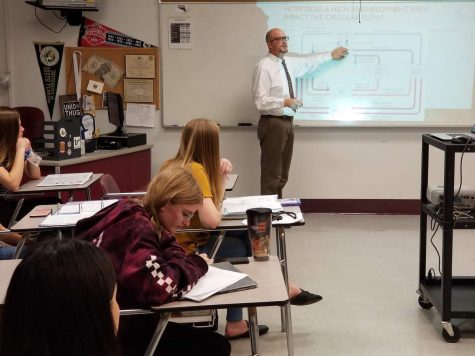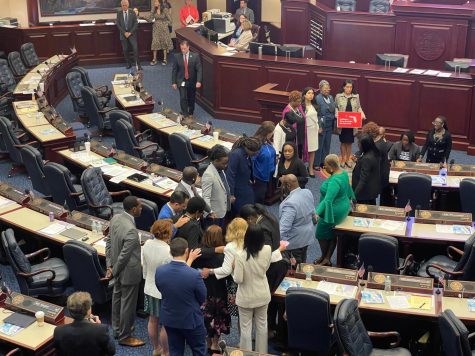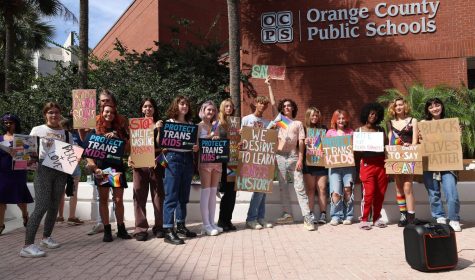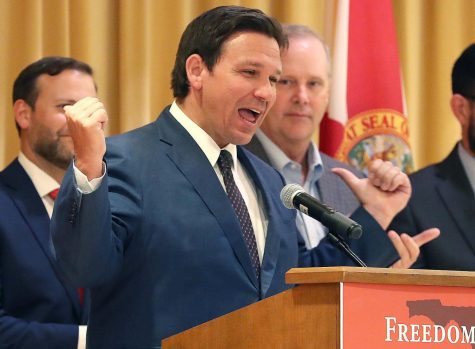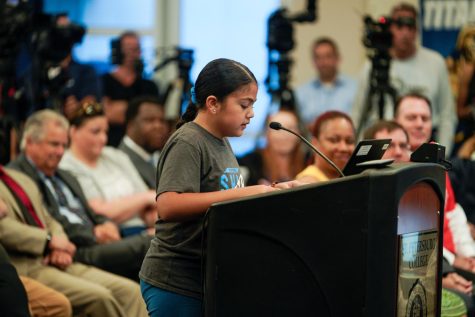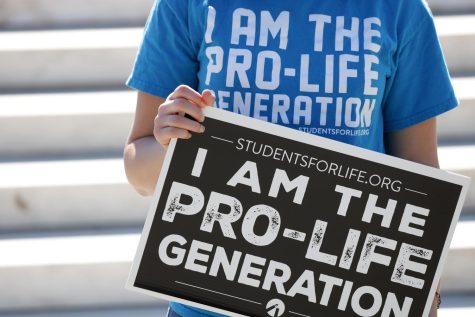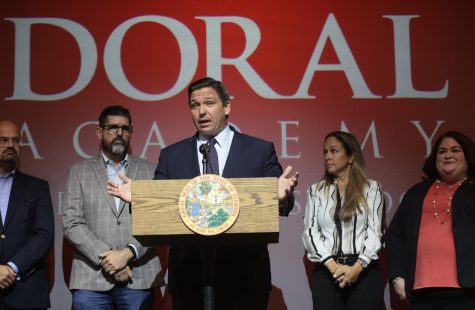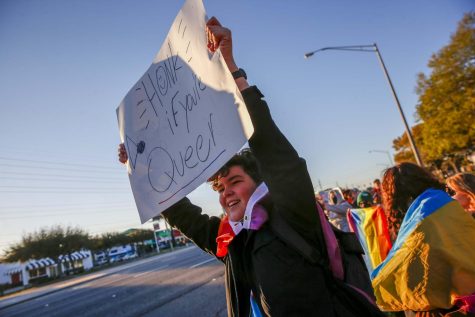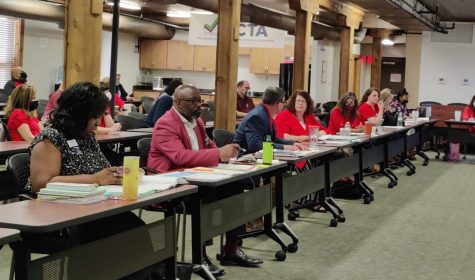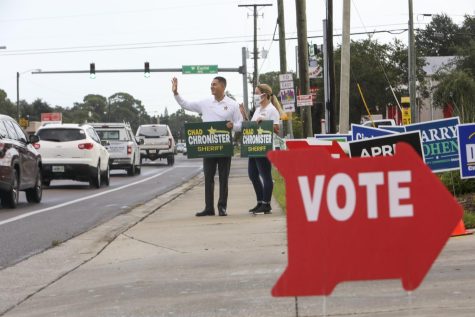Tribune News Service
Zoe Sanchez, 9, a student at SouthShore Charter Academy School, makes remarks on behalf of her school during a meeting Wednesday of Florida’s State Board of Education, held at St. Petersburg College Seminole Campus. “I cannot say enough how much I love my school,” she told board members. Courtesy of Martha Asencio-Rhine/TNS.
Charter school decisions to shift to the state rather than staying in local counties
Newly passed through the Florida Legislature, SB 892 will make major modifications to charter school authority in the state of Florida. Previously, Broward County Public Schools had the authorization to approve the building of charter schools within the county as well as the authorization to shut them down; with the addition of SB 892, the state will be fully responsible for that authorization and will be responsible for approving the establishment and closing of charter schools. This bill was first introduced on March 3, 2022. It passed in the Senate with a 24-13 vote and passed in the House with a 105-10 vote.
“I, just as one board member and then as a teacher who believes in public education, I am generally opposed to the idea that local school districts have less oversight over charter schools because they directly impact the schools around us,” Sarah Leonardi, school board member for Broward County Public Schools District 3, said. “Before the legislation passed we still didn’t have a ton of power to prevent them from opening [in the] first place because a lot of times they would just appeal at the state level.”
Effective on July 1, 2022, the bill also states in order to be created, charter schools must be approved by the sponsor, which is the governing board of the charter. After this, the board will follow a public hearing according to the Florida Senate description. Changes in the curriculum taught at the proposed charter school will now be approved by the state as well. These curriculum modifications must stay consistent with state standards and will stay approved unless the Department of Education finds that they are inconsistent with the standards.
In addition to retaining the sole authority to close down charter schools as well as approve their creation, the state will also be in charge of determining the renewal of contracts, effectively cutting the districts out of the process entirely.
“I think that [the state] under its current leadership has a plan to systematically dismantle public education in the state,” Leonardi said. “I understand the rationale behind charter schools, but how we have seen them play out in this state with a lack of oversight regulation has really been detrimental to our public schools.”
About 60 days after the request for renewal, the state must consider all factors before choosing to approve or deny the request. If the request is denied, the sponsor will notify the charter school’s governing board within 10 days of the decision and must provide specific detail as to why it was denied.
The decision must be made approximately 90 days before the conclusion of the school year, and the school must renew with the same terms and conditions at least 90 days before the end of the school year.
The school, once renewal has been requested, will have a hearing conducted by the Division of Administrative Hearings. It must be conducted within the aforementioned 90 days with the judge’s final order being submitted to the sponsor shortly after.
Florida rejects 41% of math textbooks that include ‘prohibited’ content like Critical Race Theory
Tribune News Service
The Florida Department of Education in April rejected 54 of the 132 math textbooks submitted by publishers for consideration for the next school year. Courtesy of Dreamstime/TNS.
The Florida Department of Education rejected 41% of math textbooks that were submitted for this upcoming school year due to “prohibited content.” The announcement came via a press release, which defined prohibited content to include any topic involving themes of Social Emotional Learning (SEL), Critical Race Theory (CRT), Common Core or other content deemed inappropriate by the state.This year, 54 textbooks out of the 132 submitted were rejected, and a total of eight publishers had their submissions rejected for mentions of CRT, SEL and other special topics prohibited. In total, 41% of submitted textbooks were rejected. Of K-5 textbooks, 71% were rejected, and of 6-8 grade math textbooks, 20% were rejected. For 9-12 grade, 35% of textbooks were rejected.
Only one publisher, “Accelerate Learning,” had their full set of K-5 math textbooks deemed acceptable. The company was acquired by the Carlyle Group, a global investment firm, in 2018. At the same time, Virginia Gov. Glenn Youngkin, a staunch supporter of Florida Gov. Ron DeSantis, was co-CEO of the Carlyle Group, though he has since resigned in order to run for governor in Virginia.
Critical Race Theory is a heated topic in the United States today. CRT concludes that racism is rooted in American history and ingrained in U.S. institutions. This idea is commonly known as “systemic racism.” Although the term “CRT” was coined in the 1970s, it only began to gain national attention in 2020 during the reignition of Black Lives Matter protests.
Particularly controversial among conservatives, critics of the theory argue that CRT labels all white people as “oppressors” and all Black people as “oppressed.” Critics like DeSantis assert that CRT, along with similar beliefs that contend that white people are complicit in racism, makes white people feel guilty, uncomfortable and ashamed.
DeSantis’s beliefs led to the passage and signature of HB 7 on Friday, April 22, more commonly known as the “Stop WOKE Act,” which bans workplace training and school instruction that suggests people must feel “guilt, anguish or other forms of psychological distress” due to actions of people of their same race, gender or national origin. The “Stop WOKE Act,” or “The Stop the Wrongs to Our Kids and Employees Act,” further codifies the Florida Department of Education’s prohibition of teaching CRT in schools.
Social-Emotional Learning is another target for criticism, with one organization, the Child Protection League, calling it “the latest child-indoctrination scheme.” Often confused with Critical Race Theory, SEL is an education program that is designed to help children develop emotional literacy in their own feelings and others. SEL advocates want this development to occur through building empathy and helping kids self-regulate, increase sensitivity in interactions with others and communicate.
According to The Collaborative for Academic, Social and Emotional Learning, the nation’s leading organization in advancing SEL, there are five fundamental principles in SEL: self-awareness, self-management, social awareness, relationship skills and responsible decision-making.
Florida adopted SEL after the 2018 shooting at Marjory Stoneman Douglas High School that left 17 dead. SEL was seen as a way to “reduce the likelihood of at-risk students developing social, emotional, or behavioral health problems, depression, anxiety disorders, suicidal tendencies or substance use disorders.” Four years later, DeSantis and the Florida Republican party insist it is the responsibility of parents to teach their children socially and emotionally.
Some see SEL as a proponent of CRT because it informs students that some people enjoy inherent privileges or advantages due to their sex, gender, race, class or a combination of several identities.
On the contrary, SEL has faced controversy in the past from the other side for failing to properly address how discrimination, including racism, homophobia, transphobia, classism and religious discrimination, shape the experiences of students.
The Florida Department of Education and Florida Commissioner of Education Richard Corcoran did not respond to requests for interviews.
Some are worried that this recent press release will place a further burden on teachers that are already quitting their jobs at high rates.
“I thought [the rejection of the textbooks] was point-blank idiotic. The definition of bad government,” senior Logan Rubenstein said. “It’s a sad excuse to undermine our state’s education system and put a further burden on our teachers and local government.”
As the Florida school system faces mostly left-wing criticism, some think this legislation is just another step in the wrong direction.
“Our school system already lacks conversations about mental health and Critical Race Theory in the classroom already, and to take away that important part of a student’s education is unfair to the next generation,” freshman Isabel Lopez said.
Lopez’s views concur with President of the Florida Education Association Andrew Spar, who thinks Florida is focusing on the wrong priorities.
“What educators and parents are concerned about is if we don’t have teachers in our classrooms, or bus drivers to get kids to school on time, then our kids aren’t learning math or any other subject,” Spar said in an interview with The Guardian. “We’re expecting over 9,000 teacher vacancies by the end of the year, according to the state board he appoints, and we have a massive bus driver, paraprofessional, cafeteria worker, custodian shortage in addition. We’ve heard the governor say or do nothing about it. These kinds of antics and political theater over these textbooks is exactly what’s driving people out of the profession.”
Broward County Public Schools was prepared to purchase over $34 million worth of textbooks for the upcoming 2022-2023 school year. Due to the press release, some of the state’s rejections needed to be changed to meet new state guidelines. They later approved several more一including Broward’s selection of Savvas K-5.
